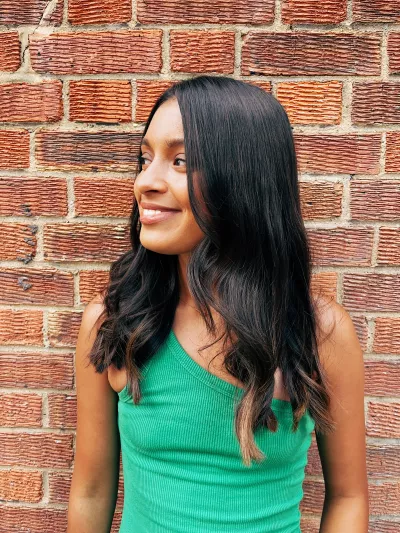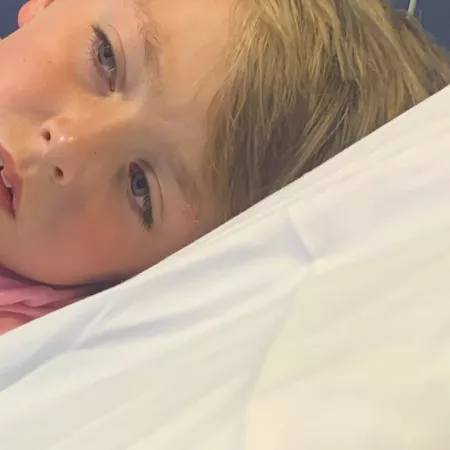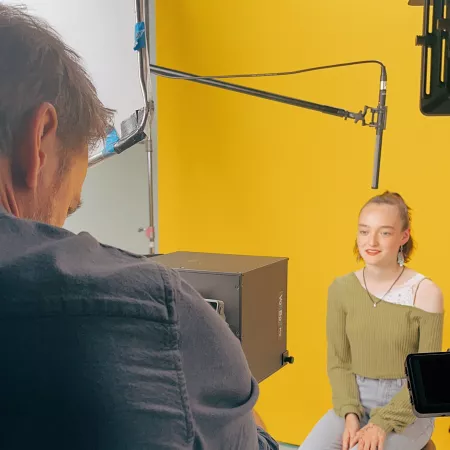I am Jasmine and I'm 17 years old.
My epilepsy means I have tonic-clonic seizures. They’re big ones. I fall to the floor and shake. They're over five minutes long. And yeah, I have minimal control, so I have prolonged seizures.
Before I have a seizure, I kind of know I'm gonna have one. I get a bit of an aura. Normally, that's like a headache or my arm goes a bit tingly. I can normally get myself into a safe situation. And then I'll have my seizure. I don't really remember anything after. I just wake up and feel a bit drowsy. I sleep for, like, 14 hours after. I had my first seizure when I was 15. I was at school. At first everyone thought I'd passed out, but I'd actually had a seizure. I think there was a lot of worry at first. I didn't really know what to expect. I mean, everyone was instantly a bit confused, I suppose, because I'd never had one before. I didn't really know anyone who’d had a seizure before either. So they were all a bit surprised, a bit ignorant about it at first. But, over time, they got a bit more understanding about it.
I didn't really know much about seizures. Kind of the same as everyone else, I thought they were caused by flashing lights, that sort of thing. I didn't realise they could be triggered by other things. I got diagnosed within about six months, because my seizures were quite frequent at the time. So they just rushed me through the system, and I had an EEG. It kind of opened my eyes up that I did actually have epilepsy. At first, it was a massive change, because obviously I had a lot of freedom taken away because of it. Then, over time, I kind of got used to it. I realised you can actually still get along with a normal life and start your GCSEs.

So, work in school was constant. And I was training a lot. I was doing football and athletics after school, about four times a week. I think the sport motivated me. I had to learn what my triggers were and what could affect me, I suppose. One of my main triggers is a lack of sleep. If I'm, like, really tired, for example. Or if I get unwell. For example, a chest infection could trigger a seizure. And if I miss one anti-seizure medication, it can trigger one. There’s also my diet. I think that affects it a little bit, like if I don't eat enough, or don’t get enough sugar, I suppose. For school days, I have to make sure I get enough hours of sleep and don’t let everything clash, and overload on training and school work.
Just making sure that I take good care of myself is probably the most important part.
Obviously, when you're 15, you're not exactly taking good care of yourself. You just want to get the best grades and have fun with your friends. And all of a sudden, you have to look after yourself and check what you're eating, and that you're getting enough sleep and don't stay up too late. I was tired all the time. I’d have to sleep a lot. My friends didn’t want to interrupt my life. They wouldn’t invite me to parties because they thought I was too tired and flashing lights would cause a seizure. But my seizures don't get caused by flashing lights. So, yeah, I had to educate my friends.
At first, school life was a massive change. I missed a lot of time in education. I think I missed about three months in total. And obviously we had exams and that was quite a big chunk of learning to miss out on. So, you’re on your own. The fact I was trying to teach myself was really difficult sometimes. I just used my textbooks and the internet, I suppose. To learn what I needed to know. I didn’t get much support from the school at first. They lacked understanding. They didn't really provide the schooling that I probably could have done with at the time. But, over time, they learned and got better at it. I don't think teachers really understood me at first. Or they didn't really put in the effort to understand. I think they just kind of shoved me to the side a little bit. I think, at first, they were just as overwhelmed as I was. I don't think they really knew how to react. And they were just as shocked as I was because obviously before that I’d been healthy. But over time, with me explaining stuff, they realised seizures weren't such a scary thing.
After I finished my GCSEs, I decided to move schools because I still wasn't really understood at my school. I wanted to move to a school where I knew someone else who had epilepsy. I think that was enough for me to move because I just wanted someone who could support me a bit more with my journey.
I knew I was more likely to be understood. That means a lot to me, because it means I don't get excluded from as many activities and I can be just like all my friends.
Recently, in sixth form, we had work experience for Year 10s and 12s. I expected to take part like every other person but my school just said “no”. They said it was too risky because of my epilepsy. So, they wouldn't allow me to go and get work experience like every other student. I could have done because my seizures are well controlled. I haven't had one for two months. Work experience is only a week long. So, it wasn't exactly a massive risk. But they just felt like it was. And I was thinking, but anyone could have an injury on work experience. Mine wasn’t going to be in a dangerous environment. It was quite controlled.
I don't understand why I wasn't allowed to go and I don't think I should have been excluded from it.
I think if they really cared about me going into work experience, they could have put in some effort to communicate with me a bit better and with the workplace. They could have just communicated the fact that I had epilepsy and, instantly, that understanding would have been there. But they didn't do that. I mean, I go to school every day and one day I will have to go to work every day. And I'll just have to get on with it then. So, I can do it now.
I missed out on a really important opportunity because they didn’t understand.
I don’t think there’s any excuse for not understanding epilepsy anymore. There's so much information out there. You can choose to find stuff out or just stay ignorant. Just do a quick Google search. You’ll find it.

One positive outcome is in athletics, where my epilepsy is understood. I don't really get discriminated against there. A few years ago there was a girl in my group that I trained with, and she had Type 1 diabetes. She was younger than me and kind of looked up to me. That meant I could help her and let her know, just because you've got that problem, it doesn't stop you from doing what you want to do. There’s a lot of neuroscience in athletics anyway. Understanding how the mind plays a part in sports. I suppose because of that, there's not so much of a stigma around epilepsy. I think that's why I enjoy athletics so much. My favourite thing is hurdling. Which sounds so silly, because it's running and jumping over a few barriers. But I love doing it. In our school, we did a 5K colour run to raise money for Young Epilepsy. Obviously, I kind of led that, I suppose, because I'm known to have epilepsy in my school. It was quite fun. I mean, everyone got involved and we raised quite a lot of money, and that was great.
When I’m older, I want to be a sports journalist. That's my dream goal. I love sports journalism because, obviously, I watch a lot of sport and look at how it's broadcast. I just think, what better thing is there to do? In Year 12, I want to take on work experience and get some practice. Obviously, it's always great when you’re trying to start a career and can say, “Oh, I've worked at this firm helping out.” Unfortunately, I wasn't allowed to do that, purely because of my epilepsy. But when I'm older, and I do work in that career, my epilepsy won't affect me.
Help schools to understand epilepsy and give students like me the same opportunities as their friends.



